Iain McMordie,
Downpatrick,
Co Down
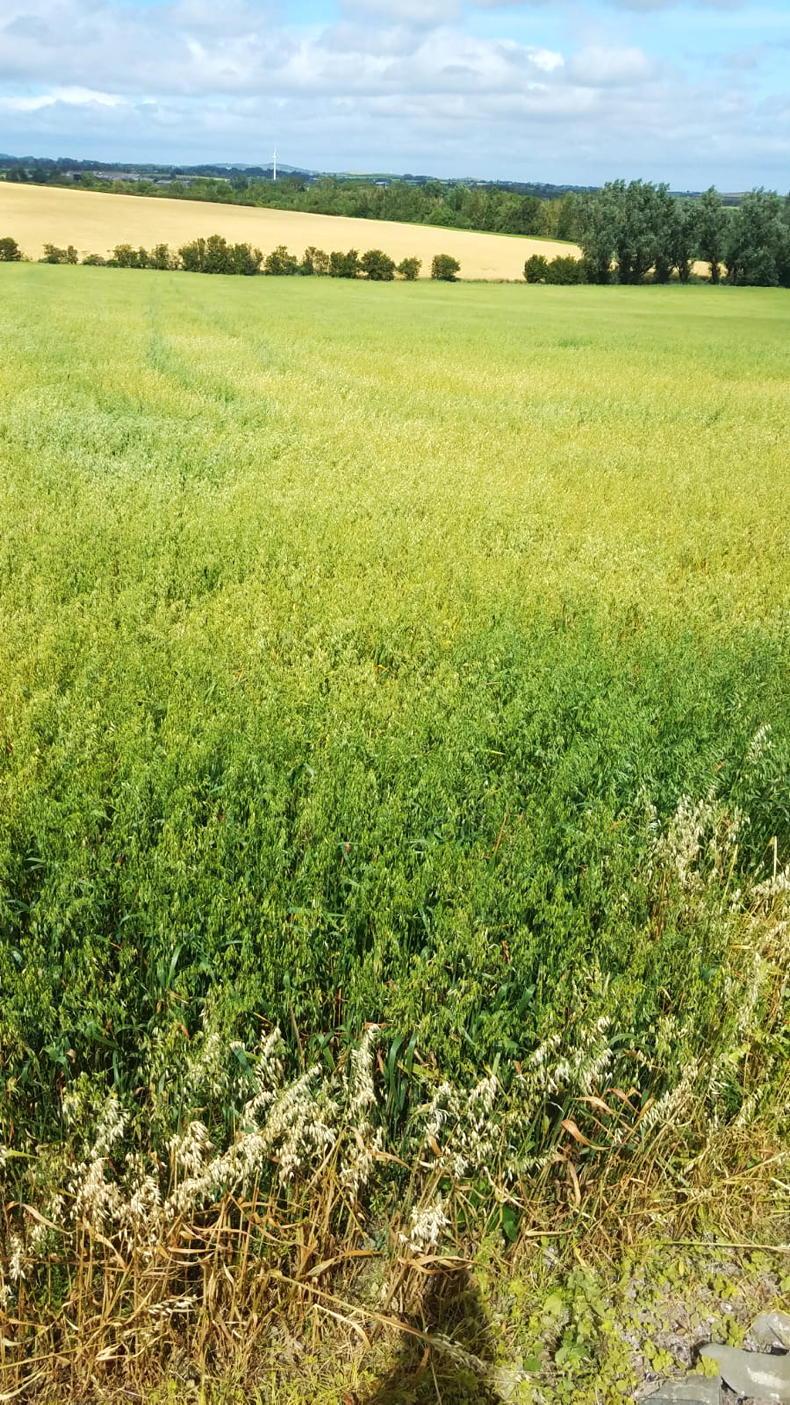
Some of Iain's oats have been suffering from drought.
Iain McMordie was cutting winter barley last week and it has been an unsettled start. Volunteer winter wheat needed to be sprayed off in the winter barley and this was carried out in the first and second week of July. Iain does not usually apply glyphosate pre-harvest, but the volunteer wheat necessitated this.
The Mountain two-row barley was ready for the chop and cutting started on the afternoon of 19 July, before a thunder storm halted work 20 minutes later.
However, the crop dried up to be cut at 19% moisture content later that evening and the field finished up at a moisture content of 16% the next day. The Mountain yielded 3.2t/ac, corrected to 14% moisture content.
Yields
Iain commented that yields haven’t improved since. Idyllic is a variety which claims tolerance to barley yellow dwarf virus (BYDV) and this did not hit 3t/ac. Neither did SY Kingsbarn, a hybrid variety.
Iain is putting the poor yields down to BYDV, the dry weather in the spring and early summer and poor tillering crops in some cases.
The straw on the crops cut so far has all been baled and needed to be cleared before the rain on Saturday.
When talking earlier this week, Iain still had 50ac of winter barley to cut and hoped to get this completed this week.
He expects the oilseed rape to be ready within two weeks. It has not been sprayed off, as Iain is concerned about having brittle plants and pod shatter, particularly if the weather turns for harvest.
The winter wheat is coming in fast. It will be two to three weeks before harvest and Iain expects the Extase to be ripe before Costello. Some of the wheat straw will be chopped, as he does not have orders for it all.
There are signs of moisture stress in the spring oats on shallow soils. The leaves are curling on the beans as they are under some pressure for water. There are a lot of pods and some disease is present.
Dan Twomey,
Robert’s Cove,
Co Cork
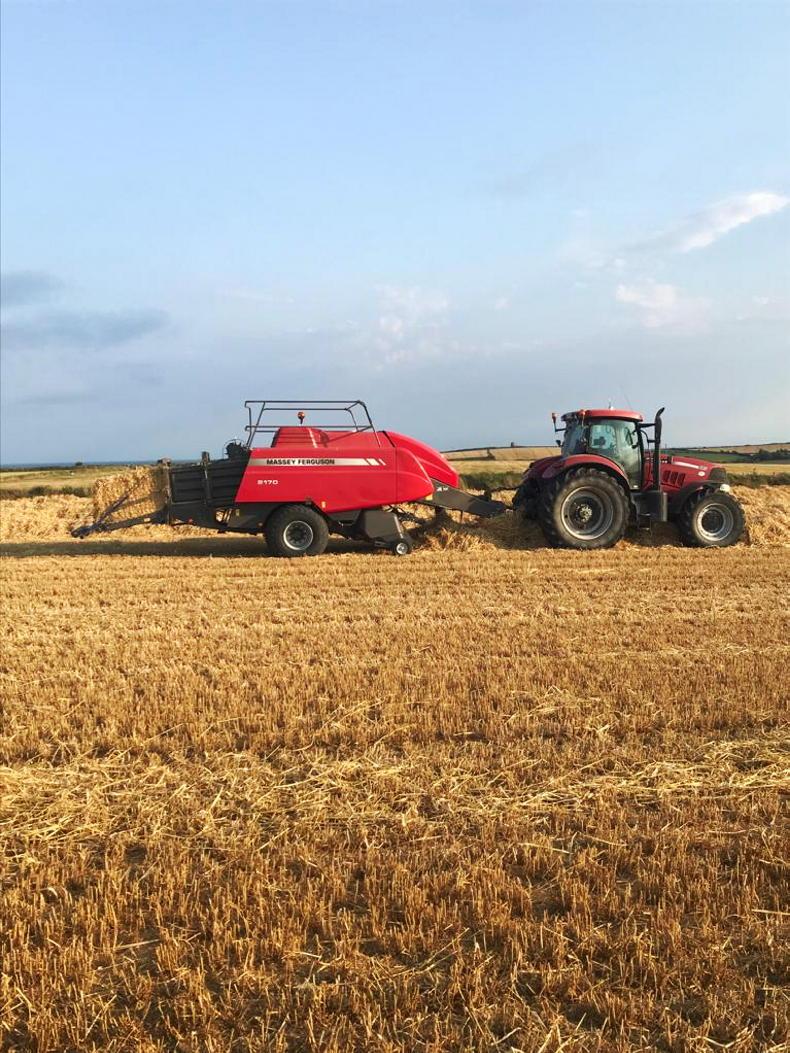
Baling winter barley straw on Dan Twomey's farm.
Dan Twomey has the winter barley harvested and 90% of the straw baled. Harvesting started on 6 July with Pixel and did not finish until 22 July. Dan described yields as moderate at 3-3.5t/ac and averaging 3.25t/ac. KPH values were at 58-60.
The four varieties were Pixel, Kosmos, Infinity and Tardis. Dan isn’t putting the lower yield than normal down to any one particular factor.
Barley yellow dwarf virus hit some fields, there was very little rain in the growing season and ramularia on some varieties probably had an impact, but it is very hard to pinpoint any major factor that hit yield.
As moisture content of the crops was low at about 17%, Dan noted that throughput through the drying plant is quick.
At the minute, Dan is finishing up drying of the winter barley and the grain is all in store.
Straw
There is still straw to be baled and Dan noted he is getting about six to eight 8x4x3 square bales per acre. Dan noted that the market is similar to other years, as he has an established customer base. A small proportion of spring crops will be chopped to return phosphorus and potassium to the soil and help to improve soil health.
Spring crops
Spring barley is looking well and Dan expects to be cutting from 1 August onwards. Planet will be among the first of the varieties to be cut. It has a nice grain at the minute and seems to have coped well with the weather this season.
Spring oats are two to three weeks away from harvest, while spring wheat is approximately one month away from harvest. Both look well.
The beet crops will need a fungicide in about two weeks’ time and Dan will keep an eye on the crop before deciding what to apply.
Derek Rogers,
Ballyboughal,
Co Dublin
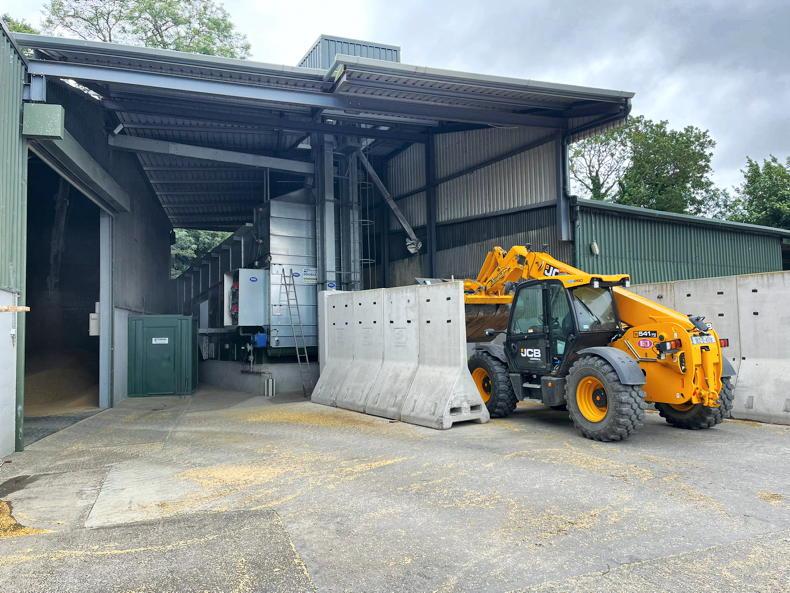
Derek has been busy loading the grain drier with winter barley for the last few weeks.
Derek Rogers was busy keeping the grain drier going on Monday this week. The winter barley, the majority of which was cut at 16-17% moisture content, was flying through the machine before being stored.
The winter barley harvest was completed in five days and by the end, the extreme heat had come and moisture content was down to 14%.
Derek was delighted with his crops, which yielded an average of 4.25t/ac. He noted that many crops in the area yielded similarly and he was very happy considering many crops across the country were yielding much lower than this.
Valerie yielded the highest, followed narrowly by Tardis, while Cassia was the lowest yielder of the three crops. Key to the good yields were high kilogrammes per hectolitre (KPH) levels, which ranged from 67 to 69.
The straw didn’t do too bad either, but Derek noted that some of it is slow to move. He added that it’s a juggling act on the farm at present, as straw needs to be gathered, grain needs to be dried and the winter oats were also cut.
The winter oats yielded around 4t/ac at an average moisture content of 16%. The straw from the winter oats was chopped.
A small amount of rain fell over the weekend in heavy showers. Derek is hoping things will dry up enough to harvest the oilseed rape crops, which should be ready this week.
Some winter wheat will be ready in the area in the first week of August, but Derek thinks his is at least two weeks away.
The Queens potato harvest started last week, but it is slow as of yet and not enough have been dug to get an indication of yield.
Blight control is being kept on top of in the maincrop potatoes. Zorvec Endavia gives 10-14 days control, which is very useful at this time of the year when there is such a busy workload on.
Derek commented that the good weather has made harvest time a lot less stressful, as there aren’t the same big deadlines to be worked towards as there is when rain is on the way.
Iain McMordie,
Downpatrick,
Co Down

Some of Iain's oats have been suffering from drought.
Iain McMordie was cutting winter barley last week and it has been an unsettled start. Volunteer winter wheat needed to be sprayed off in the winter barley and this was carried out in the first and second week of July. Iain does not usually apply glyphosate pre-harvest, but the volunteer wheat necessitated this.
The Mountain two-row barley was ready for the chop and cutting started on the afternoon of 19 July, before a thunder storm halted work 20 minutes later.
However, the crop dried up to be cut at 19% moisture content later that evening and the field finished up at a moisture content of 16% the next day. The Mountain yielded 3.2t/ac, corrected to 14% moisture content.
Yields
Iain commented that yields haven’t improved since. Idyllic is a variety which claims tolerance to barley yellow dwarf virus (BYDV) and this did not hit 3t/ac. Neither did SY Kingsbarn, a hybrid variety.
Iain is putting the poor yields down to BYDV, the dry weather in the spring and early summer and poor tillering crops in some cases.
The straw on the crops cut so far has all been baled and needed to be cleared before the rain on Saturday.
When talking earlier this week, Iain still had 50ac of winter barley to cut and hoped to get this completed this week.
He expects the oilseed rape to be ready within two weeks. It has not been sprayed off, as Iain is concerned about having brittle plants and pod shatter, particularly if the weather turns for harvest.
The winter wheat is coming in fast. It will be two to three weeks before harvest and Iain expects the Extase to be ripe before Costello. Some of the wheat straw will be chopped, as he does not have orders for it all.
There are signs of moisture stress in the spring oats on shallow soils. The leaves are curling on the beans as they are under some pressure for water. There are a lot of pods and some disease is present.
Dan Twomey,
Robert’s Cove,
Co Cork

Baling winter barley straw on Dan Twomey's farm.
Dan Twomey has the winter barley harvested and 90% of the straw baled. Harvesting started on 6 July with Pixel and did not finish until 22 July. Dan described yields as moderate at 3-3.5t/ac and averaging 3.25t/ac. KPH values were at 58-60.
The four varieties were Pixel, Kosmos, Infinity and Tardis. Dan isn’t putting the lower yield than normal down to any one particular factor.
Barley yellow dwarf virus hit some fields, there was very little rain in the growing season and ramularia on some varieties probably had an impact, but it is very hard to pinpoint any major factor that hit yield.
As moisture content of the crops was low at about 17%, Dan noted that throughput through the drying plant is quick.
At the minute, Dan is finishing up drying of the winter barley and the grain is all in store.
Straw
There is still straw to be baled and Dan noted he is getting about six to eight 8x4x3 square bales per acre. Dan noted that the market is similar to other years, as he has an established customer base. A small proportion of spring crops will be chopped to return phosphorus and potassium to the soil and help to improve soil health.
Spring crops
Spring barley is looking well and Dan expects to be cutting from 1 August onwards. Planet will be among the first of the varieties to be cut. It has a nice grain at the minute and seems to have coped well with the weather this season.
Spring oats are two to three weeks away from harvest, while spring wheat is approximately one month away from harvest. Both look well.
The beet crops will need a fungicide in about two weeks’ time and Dan will keep an eye on the crop before deciding what to apply.
Derek Rogers,
Ballyboughal,
Co Dublin

Derek has been busy loading the grain drier with winter barley for the last few weeks.
Derek Rogers was busy keeping the grain drier going on Monday this week. The winter barley, the majority of which was cut at 16-17% moisture content, was flying through the machine before being stored.
The winter barley harvest was completed in five days and by the end, the extreme heat had come and moisture content was down to 14%.
Derek was delighted with his crops, which yielded an average of 4.25t/ac. He noted that many crops in the area yielded similarly and he was very happy considering many crops across the country were yielding much lower than this.
Valerie yielded the highest, followed narrowly by Tardis, while Cassia was the lowest yielder of the three crops. Key to the good yields were high kilogrammes per hectolitre (KPH) levels, which ranged from 67 to 69.
The straw didn’t do too bad either, but Derek noted that some of it is slow to move. He added that it’s a juggling act on the farm at present, as straw needs to be gathered, grain needs to be dried and the winter oats were also cut.
The winter oats yielded around 4t/ac at an average moisture content of 16%. The straw from the winter oats was chopped.
A small amount of rain fell over the weekend in heavy showers. Derek is hoping things will dry up enough to harvest the oilseed rape crops, which should be ready this week.
Some winter wheat will be ready in the area in the first week of August, but Derek thinks his is at least two weeks away.
The Queens potato harvest started last week, but it is slow as of yet and not enough have been dug to get an indication of yield.
Blight control is being kept on top of in the maincrop potatoes. Zorvec Endavia gives 10-14 days control, which is very useful at this time of the year when there is such a busy workload on.
Derek commented that the good weather has made harvest time a lot less stressful, as there aren’t the same big deadlines to be worked towards as there is when rain is on the way.









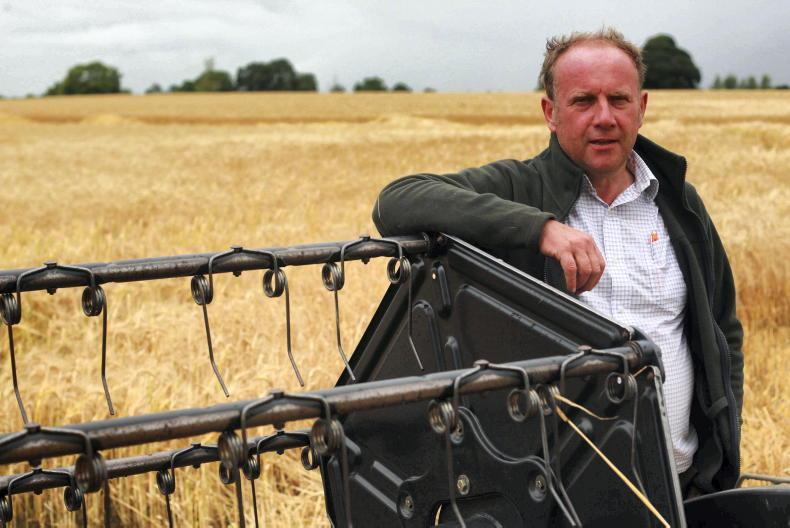

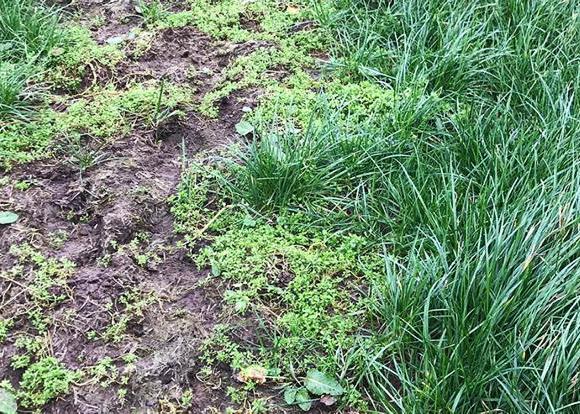
SHARING OPTIONS